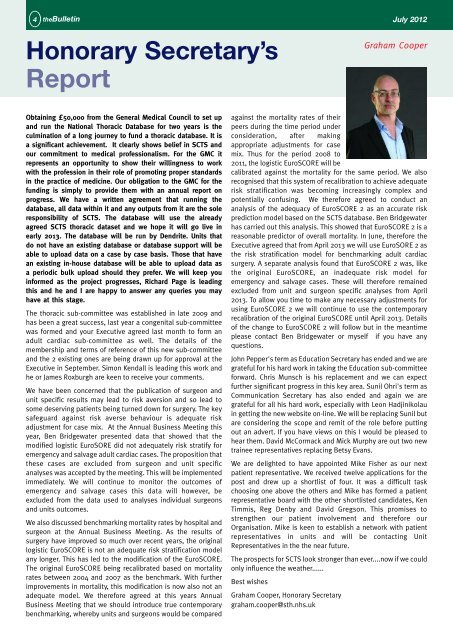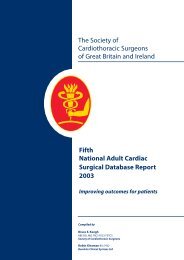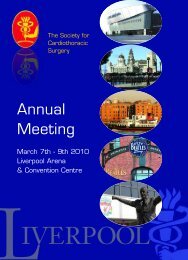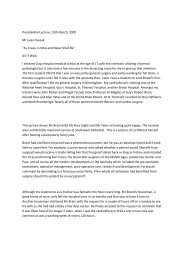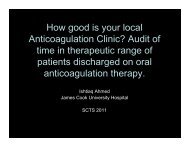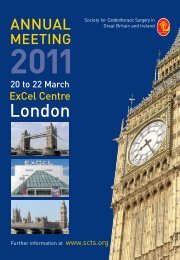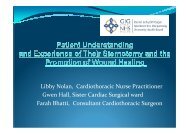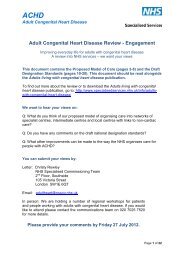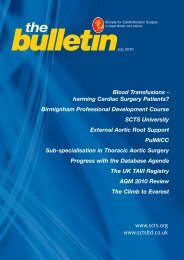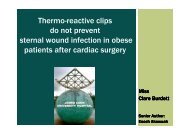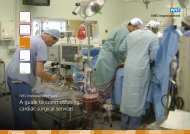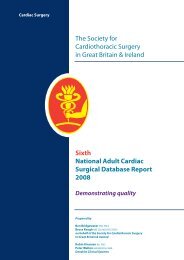Download - Society for Cardiothoracic Surgery
Download - Society for Cardiothoracic Surgery
Download - Society for Cardiothoracic Surgery
You also want an ePaper? Increase the reach of your titles
YUMPU automatically turns print PDFs into web optimized ePapers that Google loves.
4 theBulletin<br />
July 2012<br />
Honorary Secretary’s<br />
Report<br />
Graham Cooper<br />
Obtaining £50,000 from the General Medical Council to set up<br />
and run the National Thoracic Database <strong>for</strong> two years is the<br />
culmination of a long journey to fund a thoracic database. It is<br />
a significant achievement. It clearly shows belief in SCTS and<br />
our commitment to medical professionalism. For the GMC it<br />
represents an opportunity to show their willingness to work<br />
with the profession in their role of promoting proper standards<br />
in the practice of medicine. Our obligation to the GMC <strong>for</strong> the<br />
funding is simply to provide them with an annual report on<br />
progress. We have a written agreement that running the<br />
database, all data within it and any outputs from it are the sole<br />
responsibility of SCTS. The database will use the already<br />
agreed SCTS thoracic dataset and we hope it will go live in<br />
early 2013. The database will be run by Dendrite. Units that<br />
do not have an existing database or database support will be<br />
able to upload data on a case by case basis. Those that have<br />
an existing in-house database will be able to upload data as<br />
a periodic bulk upload should they prefer. We will keep you<br />
in<strong>for</strong>med as the project progresses, Richard Page is leading<br />
this and he and I are happy to answer any queries you may<br />
have at this stage.<br />
The thoracic sub-committee was established in late 2009 and<br />
has been a great success, last year a congenital sub-committee<br />
was <strong>for</strong>med and your Executive agreed last month to <strong>for</strong>m an<br />
adult cardiac sub-committee as well. The details of the<br />
membership and terms of reference of this new sub-committee<br />
and the 2 existing ones are being drawn up <strong>for</strong> approval at the<br />
Executive in September. Simon Kendall is leading this work and<br />
he or James Roxburgh are keen to receive your comments.<br />
We have been concerned that the publication of surgeon and<br />
unit specific results may lead to risk aversion and so lead to<br />
some deserving patients being turned down <strong>for</strong> surgery. The key<br />
safeguard against risk averse behaviour is adequate risk<br />
adjustment <strong>for</strong> case mix. At the Annual Business Meeting this<br />
year, Ben Bridgewater presented data that showed that the<br />
modified logistic EuroSORE did not adequately risk stratify <strong>for</strong><br />
emergency and salvage adult cardiac cases. The proposition that<br />
these cases are excluded from surgeon and unit specific<br />
analyses was accepted by the meeting. This will be implemented<br />
immediately. We will continue to monitor the outcomes of<br />
emergency and salvage cases this data will however, be<br />
excluded from the data used to analyses individual surgeons<br />
and units outcomes.<br />
We also discussed benchmarking mortality rates by hospital and<br />
surgeon at the Annual Business Meeting. As the results of<br />
surgery have improved so much over recent years, the original<br />
logistic EuroSCORE is not an adequate risk stratification model<br />
any longer. This has led to the modification of the EuroSCORE.<br />
The original EuroSCORE being recalibrated based on mortality<br />
rates between 2004 and 2007 as the benchmark. With further<br />
improvements in mortality, this modification is now also not an<br />
adequate model. We there<strong>for</strong>e agreed at this years Annual<br />
Business Meeting that we should introduce true contemporary<br />
benchmarking, whereby units and surgeons would be compared<br />
against the mortality rates of their<br />
peers during the time period under<br />
consideration, after making<br />
appropriate adjustments <strong>for</strong> case<br />
mix. Thus <strong>for</strong> the period 2008 to<br />
2011, the logistic EuroSCORE will be<br />
calibrated against the mortality <strong>for</strong> the same period. We also<br />
recognised that this system of recalibration to achieve adequate<br />
risk stratification was becoming increasingly complex and<br />
potentially confusing. We there<strong>for</strong>e agreed to conduct an<br />
analysis of the adequacy of EuroSCORE 2 as an accurate risk<br />
prediction model based on the SCTS database. Ben Bridgewater<br />
has carried out this analysis. This showed that EuroSCORE 2 is a<br />
reasonable predictor of overall mortality. In June, there<strong>for</strong>e the<br />
Executive agreed that from April 2013 we will use EuroSORE 2 as<br />
the risk stratification model <strong>for</strong> benchmarking adult cardiac<br />
surgery. A separate analysis found that EuroSCORE 2 was, like<br />
the original EuroSCORE, an inadequate risk model <strong>for</strong><br />
emergency and salvage cases. These will there<strong>for</strong>e remained<br />
excluded from unit and surgeon specific analyses from April<br />
2013. To allow you time to make any necessary adjustments <strong>for</strong><br />
using EuroSCORE 2 we will continue to use the contemporary<br />
recalibration of the original EuroSCORE until April 2013. Details<br />
of the change to EuroSCORE 2 will follow but in the meantime<br />
please contact Ben Bridgewater or myself if you have any<br />
questions.<br />
John Pepper's term as Education Secretary has ended and we are<br />
grateful <strong>for</strong> his hard work in taking the Education sub-committee<br />
<strong>for</strong>ward. Chris Munsch is his replacement and we can expect<br />
further significant progress in this key area. Sunil Ohri's term as<br />
Communication Secretary has also ended and again we are<br />
grateful <strong>for</strong> all his hard work, especially with Leon Hadjinikolau<br />
in getting the new website on-line. We will be replacing Sunil but<br />
are considering the scope and remit of the role be<strong>for</strong>e putting<br />
out an advert. If you have views on this I would be pleased to<br />
hear them. David McCormack and Mick Murphy are out two new<br />
trainee representatives replacing Betsy Evans.<br />
We are delighted to have appointed Mike Fisher as our next<br />
patient representative. We received twelve applications <strong>for</strong> the<br />
post and drew up a shortlist of four. It was a difficult task<br />
choosing one above the others and Mike has <strong>for</strong>med a patient<br />
representative board with the other shortlisted candidates, Ken<br />
Timmis, Reg Denby and David Gregson. This promises to<br />
strengthen our patient involvement and there<strong>for</strong>e our<br />
Organisation. Mike is keen to establish a network with patient<br />
representatives in units and will be contacting Unit<br />
Representatives in the the near future.<br />
The prospects <strong>for</strong> SCTS look stronger than ever....now if we could<br />
only influence the weather......<br />
Best wishes<br />
Graham Cooper, Honorary Secretary<br />
graham.cooper@sth.nhs.uk


